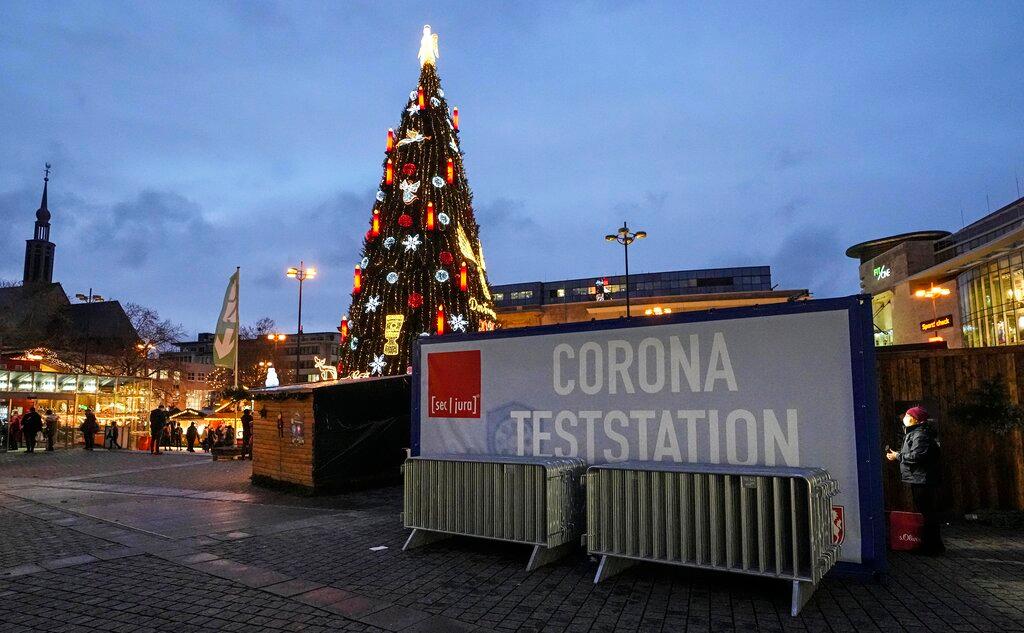Germany cracks down on unjabbed to tackle Covid surge
Chancellor Angela Merkel also speaks in favour of compulsory vaccinations, which parliament is due to vote on soon.
Just In
Germany will impose sweeping curbs on people not vaccinated against Covid-19 to combat the latest surge in cases, Chancellor Angela Merkel said Thursday after meeting regional leaders.
“Culture and leisure nationwide will be open only to those who have been vaccinated or recovered,” Merkel said, adding that the same rule would also apply to non-essential shops.
The outgoing chancellor also spoke out in favour of compulsory vaccinations, which parliament is due to vote on soon.
“Given the situation, I think it is appropriate to adopt compulsory vaccination,” she said.
Merkel, her designated successor Olaf Scholz and the leaders of 16 states tightened Covid restrictions just two weeks ago, but met again on Thursday to discuss tougher measures.
The plans include a blanket ban on entering venues including bars, restaurants and cinemas for anyone who has not been vaccinated or recovered from Covid, according to a document signed off by the leaders.
The unimmunised will also be banned from Christmas markets, as well as being hit by contact restrictions limiting the number of people they can socialise with.
The agreement also includes new restrictions on large gatherings, which would affect events such as Bundesliga football matches, and the closure of nightclubs in areas with a weekly incidence rate above 350 infections per 100,000 people.
Fireworks will be banned on New Year’s Eve to stop large crowds from gathering, according to North Rhine-Westphalia state premier Hendrik Wuest.
Health Minister Jens Spahn, in a caretaker role ahead of the planned swearing in of a new government next week, told the ZDF broadcaster that Germany needed “a lockdown, so to speak, for the unvaccinated”.
‘Never been as threatening’
“You can see from the decisions that we have understood the situation is very serious,” Merkel said, adding that the measures should be seen as “minimum standards” and different regions could also impose their own tougher curbs.
Infections have smashed German records in recent weeks and hospitals are sounding the alarm, with many over capacity and forced to dispatch patients elsewhere in the country for treatment.
Though Germany’s seven-day incidence rate has fallen slightly this week, it still stood at 439.2 on Thursday, with 73,209 new cases recorded in the past 24 hours.
“From the point of view of intensive and emergency medicine, the pandemic situation has never been as threatening and serious as it is today,” the Divi intensive care association warned on Wednesday, calling for a drastic tightening of restrictions.
Several hard-hit German regions have already cancelled Christmas markets and barred the unvaccinated from public spaces like gyms and leisure facilities to slow the pandemic spread.
But critics say the patchwork of rules is confusing, and Thursday’s emergency talks were aimed at coming up with nationwide rules.
Compulsory vaccinations
Some experts have blamed Germany’s fourth wave on its relatively low vaccination rate of around 68%, compared with fellow EU countries such as Spain at 79% and Portugal at 86%.
Merkel’s outgoing government had always ruled out mandatory vaccination, but the measure is now backed by politicians from across the spectrum.
Germany already announced plans earlier this month to require health workers and soldiers to get inoculated against Covid-19.
Expanding that to the general public would see the country follow the example of neighbouring Austria, which is planning mandatory vaccinations from February.
Greece has announced mandatory jabs for over 60s, with unvaccinated people facing fines if they don’t comply.
EU chief Ursula von der Leyen said Wednesday it was time for the bloc to “think about mandatory vaccination” against Covid, though she also stressed it was up to individual states to make the decision.
Subscribe to our newsletter
To be updated with all the latest news and analyses daily.
